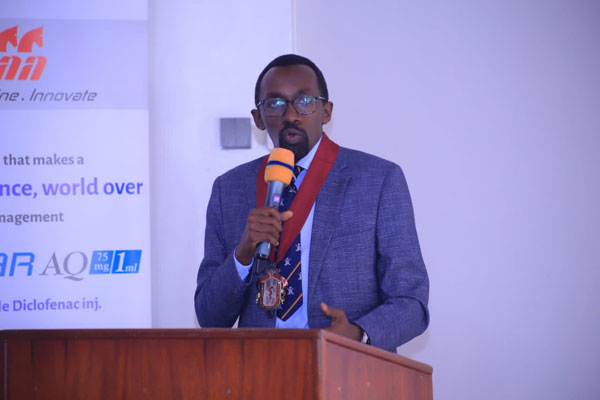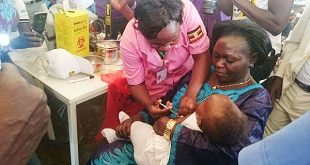
Kampala, Uganda | THE INDEPENDENT | The enactment of human organ donation and transplant law and the first-ever kidney transplant at Mulago has drawn mixed reactions. For patients waiting for a life-saving organ transplant, the new law and the commencement of kidney transplants in Uganda raise hope.
However, the living organ donation program has also been received with skepticism to the extent that it may be a difficult task to convince individuals to donate one of their kidneys or part of their liver to save lives.
Because of the need to have organ donation as part of Uganda’s health system, and the fact that the majority of Uganda may not be well-informed about organ donation, Uganda Radio Network (URN) is publishing a series of articles about organ transplantation.
URN hopes that the patients, potential organ donors, and caregivers will be informed about the diseases, organ transplant processes, who should donate an organ, and what to expect before and after surgery. In the first part, what is organ donation, the two types of organ donation, and why Uganda has at its inception chosen living organ donation?
Dr. Frank Asiimwe, a Transplant Surgeon and Consultant Urologist at Mulago National Referral Hospital agrees that the population needs to be equipped with information if they are to participate. For example, some Ugandans have suggested that the theft and trafficking of human organs is likely to increase.
Responding to those and other fears Dr. Asiimwe has explained that the harvesting of organs and their transplant is not as simple as Ugandans assume.
“I will use my old example. It is not like getting spare parts from a vehicle and putting them in another. Because for a spare part, you can keep it in our home. Until you get a willing buyer but an organ begins deteriorating. People are asking how long an organ spends outside the body. You are talking of hours,” he explained.
What is Organ Donation?
When a person needs an organ transplant, it is because one of their organs is working very poorly or failing. Undergoing an organ transplant can lengthen a person’s life and allow those with a chronic illness to live a normal lifespan.
“People after they have had their kidney fail, and when that failure is irreversible, ultimately, they need a new kidney. Before that kidney is obtained, we keep those patients on what we call dialysis. The dialysis is every week. Twice a week or thrice a week. The patient comes, and his or her blood is filtered of all the toxins. The machine does the work of a kidney” said Asiimwe.
Categories/ groups of Organ Transplants
There are two categories of organ transplants. Uganda has in the meantime chosen to implement the living donor program.
With living donation, a living person donates an organ or part of an organ for transplantation. Most living donors donate one of their kidneys or a part of their liver. Much more rarely, living donors may donate other organs.
“It must begin with a sick person whom the nephrologist (in case of a Kidney) advises that your kidney has failed, we cannot reverse this failure. You need to get a new kidney. So you find a donor. And then the nephrologist will guide who are the best donors,” Asiimwe explained
It has been a practice globally that those seeking organ donations should get them from close relatives. So the less related one is to the sick person, the more likely for the body to fight back more aggressively. “So we advise that the donor who is being sought must be related to the patient,” said Dr. Asiimwe.
This advice still holds in most parts under the living donor program though with advances in technology and the science around organ transplants, one can now receive an organ from a person he/she may not be related to.
“Of course the science right now in the world can get anyone to donate whether related or otherwise. But for the best outcome and in our case in Uganda, we prefer that the donor should be your child your uncle, or your parent. That is the first group. Or your cousins, nephews, or your nieces. That is the second group,”
So Uganda’s living donor program seeks to get organs from living persons. “The only other person we allow who is unrelated is the spouse. Because most likely they are willing because of love,” Dr. Asiimwe told URN.
Most living donors donate one of their kidneys or a part of their liver. Much more rarely, living donors may donate other organs. Living donation is typically safe for the donor. Most living donors go on to live active, healthy lives and can see the positive impact of their donation.
Cadaveric Organ donation program. The second category of organ donation is known as cadaveric organ donation (COD).
After death, several organs such as the heart, lungs, kidneys, liver, small bowel, pancreas, bone marrow, skin, and cornea among others can be removed to save the lives of patients that need them.
“In this case, it can be Fran who is alive right now can say that should I be dead, if my organs can be useful, please take them out. Frank will swear an affidavit to show that they can removed when he becomes brain dead, and the organs will removed for donation,” said Asiimwe.
Brain death also known asbrain stem death is when a person on an artificial life support machine no longer has any brainfunctions. The diagnosis of brain death is defined as “death based on the absence of all neurologic function.”
So once medics declare that a brain-dead person is dead, that is when organ harvesting is authorized.
The second part of the series will delve into aspects of the Human Organ Donation And Transplant Act, of 2022. It will explain why one can’t sell an organ and other aspects of that law.
*******
URN
 The Independent Uganda: You get the Truth we Pay the Price
The Independent Uganda: You get the Truth we Pay the Price


